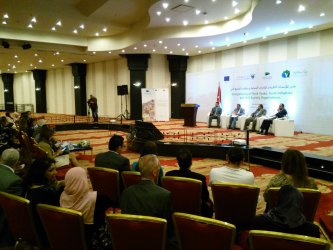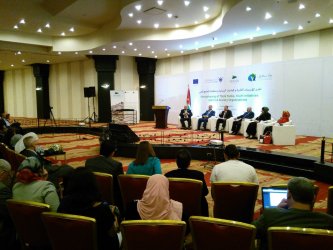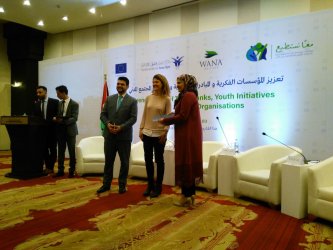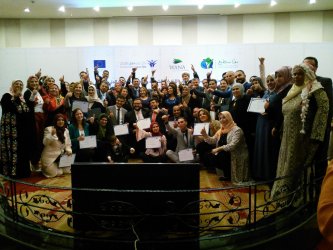-
Project to Strengthen Jordanian Civil Society Comes to a ...
Project to Strengthen Jordanian Civil Society Comes to a Close
On 15 April, 80 Community-Based Organisations (CBOs), youth initiatives and policy think tanks gathered for the closing ceremony of the European Union funded Civil Society Project carried out by the West Asia-North Africa (WANA) Institute in cooperation with the National Center for Human Rights. The ceremony was held under the patronage of HRH Prince El Hassan bin Talal, chairman and founder of the WANA Institute.
The ceremony discussed Jordan’s development priorities, the role of civil society organisations (CSOs) in protecting human rights, the needed policy reforms, and how to increase policy dialogue opportunities for youth.
HRH Prince El Hassan bin Talal noted in his keynote speech that human capital is Jordan’s most precious resource: “It is high time we divide the responsibilities between the public sector, private sector and civil society equally. It is time for Jordan to focus on empowering its youth, women and refugee population, and I thank the donors and international agencies for their support to Jordan’s civil society.”
“The EU takes pride in its partnership with the CSOs in Jordan,” EU Ambassador Andrea Fontana stated during his speech. He stressed on the vital role of CSOs in promoting sustainable development and achieving national priorities, adding that the EU and its Member States recognise the CSOs as development actors.
Building the Capacity of Jordan’s Civil Society
Throughout the project, the participating CBOs and Youth Initiatives received intensive capacity-building workshops on Community Development, Human Rights, Research Methods, Problem Assessment, Strategic Management, Project Design and Proposal Writing, Monitoring and Evaluation, and Advocacy.
“The session on project management was very interesting,” civil society volunteer Suhaib AlFayoun (26) from Aqaba said. “I learned how to write reports and plan strategically, which will improve the quality of our initiative.”
Khloud Saharneh (32) from Tafileh co-founded an association for children with autism one year ago. “It’s my first experience working for a CBO, so this series of workshops was very useful. I learned a lot from the human rights session.”
She also pointed out that many CBOs struggle with a lack of funding: “The first year, you need to finance the project yourself and then you might find someone to fund you.” Mahmoud Nabulsi, Civil Society Team Leader at the WANA Institute, responded that “in the future, we want to work on linking the CBOs and youth initiatives with potential donors.”
He added that the project also provided a platform for policy NGOs and think tanks to exchange ideas to enhance CSOs’ participation in the public debate.
Challenges Ahead
“Actually implementing the policy recommendations that came out of this project is a challenge that lies ahead,” Nabulsi said. “A high staff turnover within CBOs also causes a loss of knowledges within certain organisations.”
He stressed that continued support for civil society in Jordan is necessary as the sector is a major service provider to citizens and refugees, advocates for policy change, and fulfills an important watchdog function.




